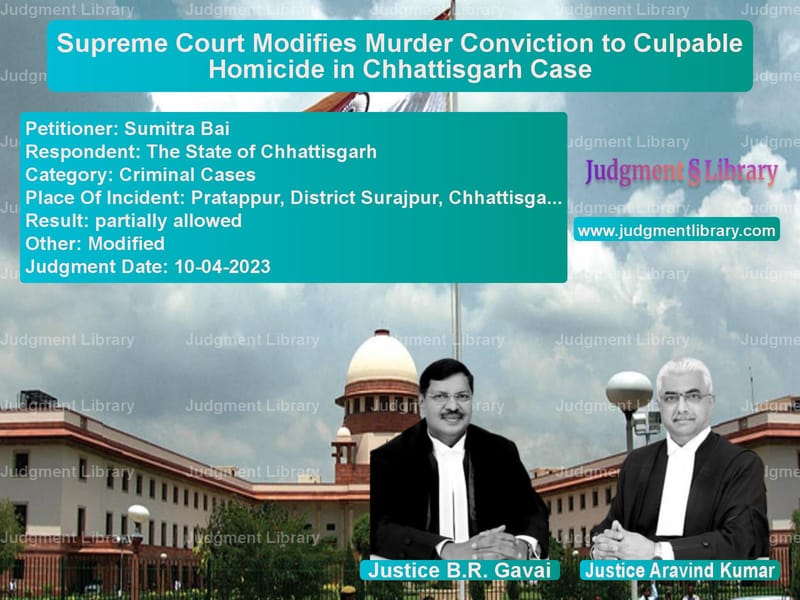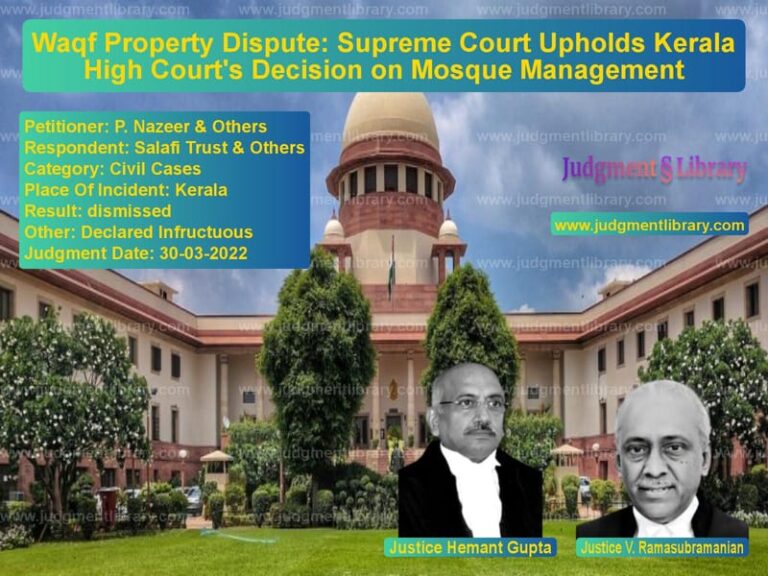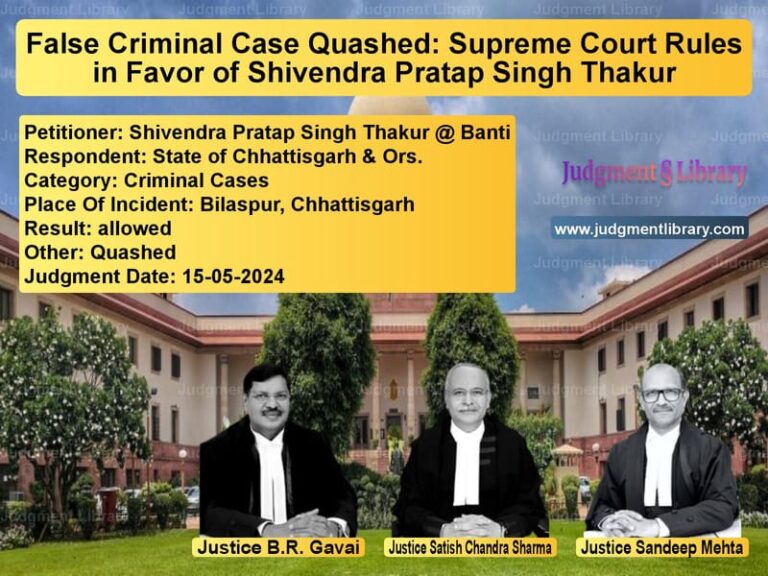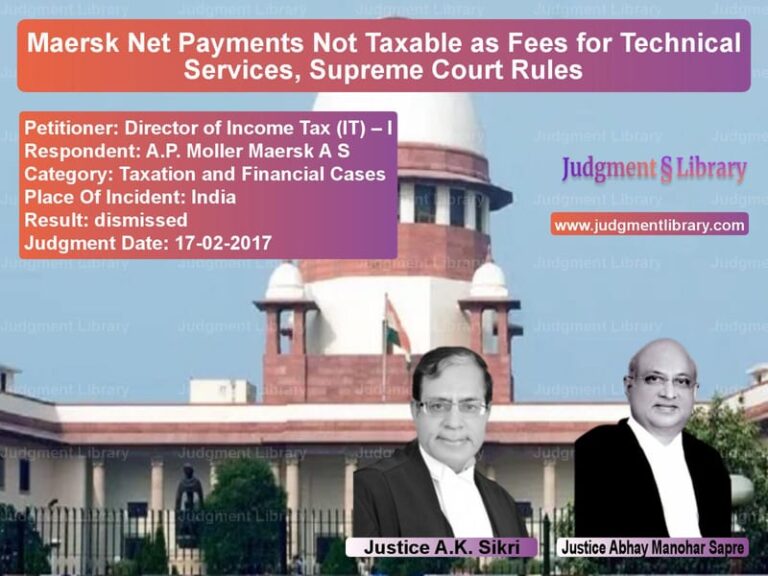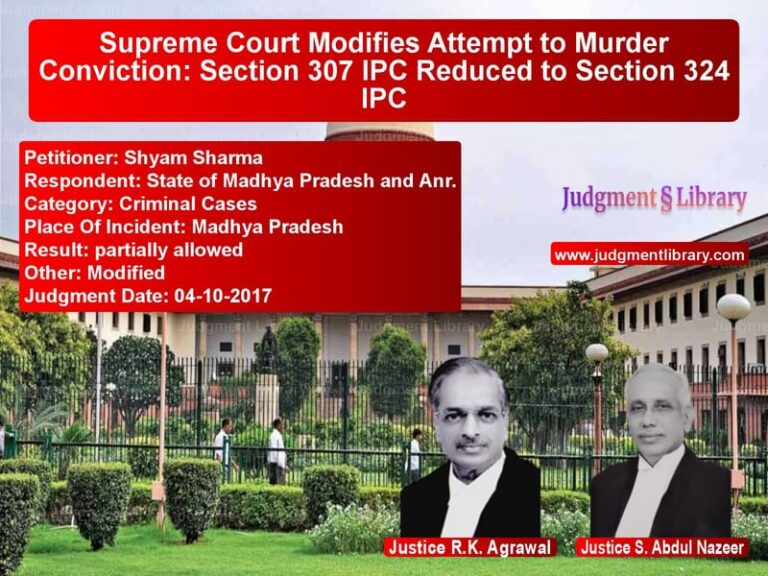Supreme Court Modifies Murder Conviction to Culpable Homicide in Chhattisgarh Case
The case of Sumitra Bai vs. The State of Chhattisgarh revolves around a conviction for murder under Section 302 of the Indian Penal Code (IPC). The Supreme Court of India reconsidered the case based on the evidence of mental illness and lack of intent. After analyzing the circumstances, the Court modified the conviction from murder to culpable homicide not amounting to murder under Section 304 Part I of IPC. The Court also ordered the immediate release of the accused as she had already served 12 years in prison.
Background of the Case
The case dates back to an incident where the accused, Sumitra Bai, was charged with the murder of her father, Mangal Sai. The incident occurred at the house of PW-1 Mahipal in Pratappur, District Surajpur, Chhattisgarh. The prosecution claimed that Sumitra Bai had assaulted her father with a spade, leading to his death. She was convicted by the Additional Sessions Judge, Pratappur in Sessions Trial No.1 of 2013 and sentenced to life imprisonment under Section 302 IPC. The Chhattisgarh High Court later upheld this conviction.
Challenging this verdict, Sumitra Bai appealed to the Supreme Court, arguing that she was suffering from mental illness at the time of the incident and had no intention to kill her father.
Legal Issues Before the Court
- Whether Sumitra Bai’s actions constituted murder under Section 302 IPC or fell under Section 304 IPC due to lack of intent.
- Whether there was sufficient evidence to establish insanity under Section 84 IPC (Defense of Insanity).
- Whether the 12-year incarceration already undergone by the accused justified her immediate release.
Arguments by the Petitioner (Appellant – Sumitra Bai)
Sumitra Bai’s defense counsel argued:
- “The accused was mentally ill and was brought to PW-1 Mahipal’s house for treatment.”
- “The weapon used in the incident (a spade) was readily available at the scene, indicating a lack of premeditation.”
- “There was no evidence of motive or intent to kill her father.”
- “Witnesses, including PW-1 Mahipal, admitted that Sumitra Bai was suffering from mental illness.”
- “The accused should be acquitted under Section 84 IPC (Insanity Defense) or given a reduced sentence under Section 304 IPC.”
Arguments by the Respondent (State of Chhattisgarh)
The State opposed the appeal, stating:
- “The prosecution had proven beyond reasonable doubt that the accused assaulted the deceased.”
- “To claim insanity under Section 84 IPC, the accused must prove that she was incapable of understanding her actions, which was not established.”
- “Medical records proving insanity were not produced before the court.”
- “The trial court and High Court correctly applied Section 302 IPC.”
Supreme Court’s Analysis and Judgment
After carefully examining the evidence, the Supreme Court made the following observations:
- “The accused was brought to PW-1 Mahipal’s house for mental illness treatment, which is a significant factor in determining her mental condition at the time of the incident.”
- “The prosecution failed to prove the accused’s intent to cause death, a necessary element for conviction under Section 302 IPC.”
- “The act was committed impulsively, using a readily available household tool, further proving lack of premeditation.”
- “There was no clear evidence of motive, as the deceased (father) had brought the accused for treatment and was caring for her.”
Based on these findings, the Supreme Court ruled:
“We find that the case would fall under Part-I of Section 304 of the IPC and as such, conviction under Section 302 of the IPC would not be tenable.”
Key Takeaways from the Judgment
- The absence of clear intent to kill can lead to a conviction under Section 304 IPC instead of Section 302 IPC.
- Mental illness, even if not amounting to full insanity under Section 84 IPC, can be considered a mitigating factor in sentencing.
- When an accused has already undergone significant incarceration, the Supreme Court can order immediate release.
- Medical evidence of mental illness should be presented to strengthen a Section 84 IPC defense.
Impact of the Judgment
This ruling is a significant precedent in cases involving mentally ill defendants. While the Court did not accept a complete defense of insanity under Section 84 IPC, it acknowledged mental illness as a mitigating factor. The Court’s decision also emphasizes that lack of motive and premeditation can lead to a reduced charge under Section 304 IPC.
By modifying the conviction and ordering immediate release, the Supreme Court reaffirmed the principle of proportionality in sentencing, ensuring that individuals do not serve excessive prison terms for offenses where intent is not established.
Conclusion
The Sumitra Bai vs. The State of Chhattisgarh case is a landmark ruling that balances the legal framework for homicide with considerations of mental illness and proportional justice. The judgment ensures that defendants with diminished mental capacity are not unjustly penalized under the strict provisions of Section 302 IPC.
This decision serves as a guiding precedent for future cases where mental illness plays a role in criminal acts, reinforcing the importance of evaluating intent and the accused’s state of mind at the time of the offense.
Petitioner Name: Sumitra Bai.Respondent Name: The State of Chhattisgarh.Judgment By: Justice B.R. Gavai, Justice Aravind Kumar.Place Of Incident: Pratappur, District Surajpur, Chhattisgarh.Judgment Date: 10-04-2023.
Don’t miss out on the full details! Download the complete judgment in PDF format below and gain valuable insights instantly!
Download Judgment: sumitra-bai-vs-the-state-of-chhatti-supreme-court-of-india-judgment-dated-10-04-2023.pdf
Directly Download Judgment: Directly download this Judgment
See all petitions in Murder Cases
See all petitions in Bail and Anticipatory Bail
See all petitions in Attempt to Murder Cases
See all petitions in Fraud and Forgery
See all petitions in Custodial Deaths and Police Misconduct
See all petitions in Judgment by B R Gavai
See all petitions in Judgment by Aravind Kumar
See all petitions in partially allowed
See all petitions in Modified
See all petitions in supreme court of India judgments April 2023
See all petitions in 2023 judgments
See all posts in Criminal Cases Category
See all allowed petitions in Criminal Cases Category
See all Dismissed petitions in Criminal Cases Category
See all partially allowed petitions in Criminal Cases Category

